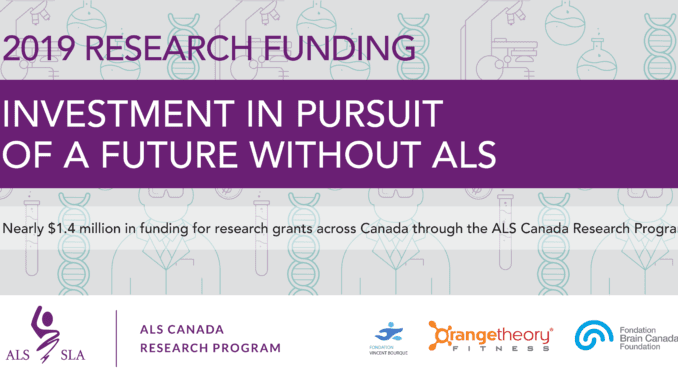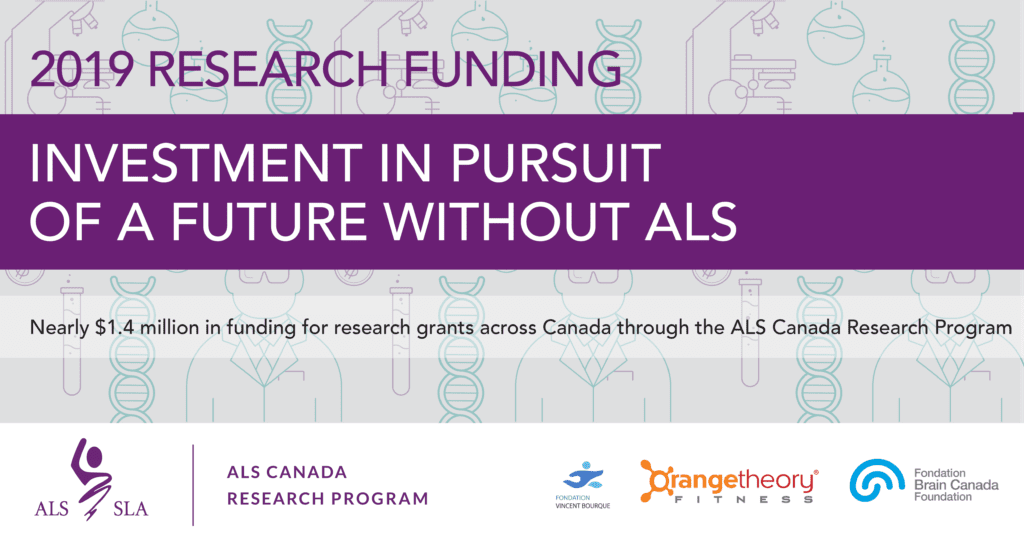
 Donor support enables ALS researchers across Canada to accelerate the impact of research discoveries.
Donor support enables ALS researchers across Canada to accelerate the impact of research discoveries.
TORONTO, November 13, 2019 — After a rigorous competition, the ALS Society of Canada today announced the recipients of the 2019 research funding grants. Through the ALS Canada Research Program, the only dedicated source of ALS research funding in Canada, nearly $1.4 million will be invested in leading-edge ALS research that will further the study of the disease. For a terminal disease like ALS, that gradually paralyzes people because the brain is no longer able to communicate with the muscles of the body typically moved at will, transformative research is needed to help accelerate understanding of disease progression and provide pathways for future therapies. Continued investment in ALS research fuels the scientific discoveries that will bring hope for a future without the disease.
More than $850,000 is being invested in ten Project Grants, and $540,000 is being invested in six Trainee Awards that will provide momentum for the next generation of promising ALS researchers. It is because of the generosity of ALS Societies, individual donors and community-based efforts, including 40 per cent of net proceeds from the Walk to End ALS fundraising events that take place across the country, that these innovative research projects aimed at providing a greater understanding of the onset and progression of ALS can happen.
“The spectrum of Canadian ALS research at the moment is incredibly rich and deep, touching on so many aspects of the disease,” said Chris Loudon, who was diagnosed with ALS in 2015 and had the opportunity to observe the peer review process that resulted in the funding of the 10 project grants. “I am impressed by the passion of the ALS research community and the dedication of the ALS Canada Research Program on furthering such vital research. As someone living with ALS, I am more hopeful than ever that ALS can and will be beat.”
“ALS is a complex disease and while we’ve made amazing advancements in recent years towards understanding of the disease processes, there is still a lot to learn,” said Dr. David Taylor, VP Research, ALS Society of Canada. “By focusing on multiple diverse projects, new avenues of understanding and treatment can be explored. Everything we support is with our vision of a future without ALS.”
Funding partners for the ALS Canada Research Program’s 2019 grants and awards are the provincial ALS Societies across Canada, Orangetheory Fitness, La Fondation Vincent Bourque, and the Brain Canada Foundation (with financial support from Health Canada) which provided funds to support three of the trainee awards as part of a commitment made after the Ice Bucket Challenge.
“The members and franchisees of Orangetheory Fitness are extremely passionate about Augie’s Quest’s vision to help the ALS community live longer, more vibrant lives. We are proud to partner with the ALS Canada Research Program to dedicate funds from the 2019 Augie’s Quest initiative in support of Canadian ALS research,” said Blake MacDonald, President, OTF Canada Inc. “We hope to continue striving for a cure, while supporting scientific discovery that will one day improve the lives of individuals and families who are affected by this rare and yet, terrible disease.”
The projects funded will answer questions that will help to accelerate research discovery contributing to the development of potential ALS therapies:
- How do unique protein interactions explain TDP-43 behaviour in different people with ALS? $100,000 awarded to Dr. Mohan Babu at the University of Regina.
- How do environmental marks on RNA play a role in how ALS is caused? $100,000 awarded to Dr. Patrick Dion at the Montréal Neurological Institute at McGill University.
- Does prior exposure to common viruses influence ALS onset and disease progression? $100,000 awarded to Dr. Matthew Miller at McMaster University.
- Does a substance in gut or oral bacteria influence the disease course of ALS? $100,000 awarded to Dr. Minh Dang Nguyen at the University of Calgary.
- Can a new ALS mouse model provide important information for understanding and treating ALS? $100,000 awarded to Dr. Jeehye Park, at the Hospital for Sick Children (SickKids) Research Institute.
- Are the same faulty nerve-muscle connections in ALS mice also occurring in humans? $100,000 awarded to Dr. Richard Robitaille at the Université de Montréal.
- What is the role of the annexin A11 gene in ALS disease processes? $100,000 awarded to Dr. Peter St. George-Hyslop at the University of Toronto.
- Can advanced technology reveal the role of multiple cell types affecting ALS in humans? $98,400 awarded to Dr. Stefano Stifani at the Montréal Neurological Institute at McGill University.
- Can earlier palliative care consultation improve patient and caregiver quality of life? $55,437 awarded to Dr. Jocelyn Zwicker and Dr. Christine Watt at the Ottawa Hospital.
- Can speech-recognition technology help diagnose ALS? In partnership with Orangetheory Fitness, $100,000 awarded to Dr. Yana Yunusova at the Sunnybrook Research Institute.
- Can an animal model provide new insights into the formation of stress granules? $75,000 awarded to Alicia Dubinski, a PhD student in Dr. Christine Vande Velde’s lab at the Université de Montréal.
- What is the role of a newly discovered protein in ALS? La Fondation Vincent Bourque | ALS Canada – Brain Canada Ph.D. Studentship of $75,000 awarded to Myriam Gagné, a PhD student in Dr. Christine Vande Velde’s lab at the Université de Montréal.
- Is the loss of normal function of C9ORF72 in a particular cell type a key driver of ALS disease processes? $75,000 awarded to Rahul Kumar, a PhD student in Dr. Peter McPherson ‘s lab at the Montréal Neurological Institute at McGill University.
- Is an experimental drug that can prevent abnormal protein behaviour in ALS already out there? La Fondation Vincent Bourque | ALS Canada – Brain Canada Ph.D. Studentship of $75,000 awarded to Marc Shenouda, a PhD student in Dr. Janice Robertson’s lab at the University of Toronto.
- Could newly discovered tags on TDP-43 protein explain its abnormal behaviour in ALS? In partnership with Brain Canada, $75,000 awarded to Terry Suk, a PhD student in Dr. Maxime Rousseaux’s lab at the University of Ottawa.
- Can new understandings about nuclear speckles lead to new treatment options for ALS? $165,000 awarded to Dr. Ulises Rodríguez Corona, a post-doctoral student in Dr. Marlene Oeffinger’s lab at Institut de recherches cliniques de Montréal (IRCM).
The funding of the 16 research projects followed a competitive peer-review process, which engaged global ALS experts to identify projects grounded in scientific excellence and with the potential to most quickly advance the field of ALS research. The peer review was observed by people who have personal experience with ALS.
About the ALS Canada Research Program and Canada’s ALS Societies.
The ALS Research Program funds peer-reviewed research grants and fosters collaboration amongst Canadian researchers, helping to nurture new ideas and build capacity. As the only dedicated source of funding for ALS research in Canada, the ALS Canada Research Program aims to accelerate research impact by providing funding for the best ALS projects focused on translating scientific discoveries into treatments for ALS. Collectively through initiatives like the Walk to End ALS, ALS Societies across Canada support the ALS Canada Research Program. ALS Societies across Canada work together to maximize our collective impact and make the greatest difference for people affected by ALS. Our approach as eight independent organizations working in partnership enables us to respond to the variation that exists between provincial healthcare systems, where we each play a role in filling gaps by providing community-based support. ALS Societies advocate federally, provincially and locally on behalf of people and families living with ALS for policy changes that will have a meaningful impact today and in the future.
For more information:
416-497-2267 x213
media@als.ca
